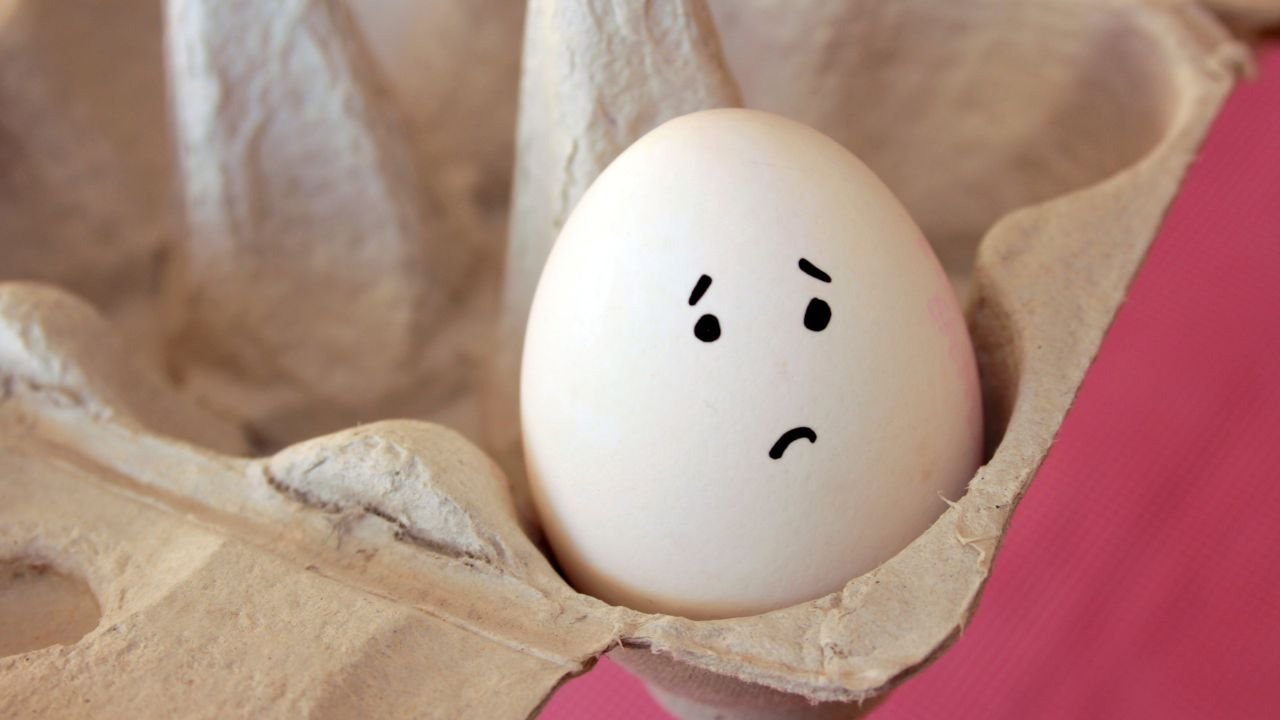Discover the Top 5 Signs of Poor Egg Quality
What are the top signs of poor egg quality? This is important information for you to have. Why? Because if poor egg quality is a reason you aren't getting pregnant then you need to turn that around and fast.
Oh, does that surprise you that there's something that can be done to help improve egg quality? Another great reason why you are here because we are going to talk about that too!
When it comes to getting pregnant with PCOS, egg quality is particularly important. There are some specific ways that PCOS impacts egg quality that needs to be addressed in order to help fertility open up.
Which is exactly why I'm happy that you are here. Too often egg quality gets dismissed from fertility plans when it actually needs to be the star of the show.
Yes, it's true that poor egg quality leads to lower chances of getting pregnant with PCOS, but there are powerful ways to help improve that egg quality which can help improve your chances of having a baby.
What is Egg Quality?
Egg quality refers to the egg having the correct number of chromosomes. Why is this important? Because if the egg doesn’t have the correct number of chromosomes, then it won’t be able to survive.
If the egg isn’t able to survive, then the egg isn’t able to connect with the sperm, implant and make a baby.
Do you see how that works?
To get even more info on egg quality and how it impacts PCOS fertility, jump on over here to read my definitive guide to egg quality and PCOS.
How do you know if you have poor or good egg quality?
Testing is a great option for a variety of issues that contribute to infertility. Testing to assess egg quality? It's not great and not easily accessible either. These are a few of the tests that are available.
Anti-mullerian hormone (AMH): This test will tell you the number of follicles in the ovaries. Over time, AMH has been used as a marker for egg quality but what it really evaluates is the number of eggs, not the quality.
Follicle stimulating hormone (FSH): FSH is a hormone involved with egg growth which is why it's used to assess egg quality. But again, it's an indirect way to see if eggs are of good or poor quality.
Transvaginal ultrasound: To assess egg quality, an antral follicle count is done during this ultrasound. This test assesses the number and size of the eggs rather than the actual quality.
DNA egg-typing: This is the best test to evaluate egg quality. During DNA egg-typing the clinic can specifically evaluate the chromosomes of your eggs. The downside of this test is that it's typically only used in the IVF setting.
While testing is mildly helpful to determine egg quality, different signs in the body can give you clues about the quality of your eggs. Let's talk about five of those signs.
Top 5 Signs of Poor Egg Quality
Top Signs of Poor Egg Quality #1: History of miscarriage
If you have a history of a miscarriage, I hope someone is talking to you about the importance of egg quality. It's estimated that 50% of miscarriages are due to poor quality eggs.
Wow, that's a pretty high number wouldn't you agree?
Here's how poor egg quality leads to miscarriage
Remember how I mentioned above that the eggs need 23 chromosomes to be of "good quality"? Well if the egg develops in the ovary and it has less or more than 23 chromosomes it might still ovulate. And that egg might even meet with the sperm and implant.
But if that egg doesn't have the right number of chromosomes then it doesn't have the correct building blocks to create a human being.
The process of creating a new life is fascinating and babies grow in miraculous ways. But in order for that to happen, they need the right amount of chromosomes to get there.
Side note: yes, a baby can grow if there are a different number of chromosomes. Familiar with Trisomy 21? Also known as Downs Syndrome? Those babies have 21 chromosomes, not 23. So yes, it's possible for babies to born with different number of chromosomes.
Top Signs of Poor Egg Quality #2: Blood sugar issues
Insulin resistance is one of the signs of poor egg quality. You may not think that your blood sugar has anything to do with getting pregnant, but they are more closely related than you think!
It's currently estimated that anywhere between 35 and 80% of people with PCOS also have insulin resistance. This is why it's so important to talk about here.
One particular study found a significant connection between insulin resistance and egg quality. This study looked at women with PCOS who were undergoing IVF.
In this study, they found that women who had insulin resistance also had:
Fewer eggs retrieved
Less eggs fertilized
A lower amount of good-quality embryos.
Talk about important for egg quality!
So if you struggle with blood sugar issues or insulin resistance and no one is talking to you about how to turn that around to support egg quality? Then you are missing out on one important piece of your fertility health that could very well be keeping you from getting pregnant.
Top Signs of Poor Egg Quality #3: No ovulation
Do you check ovulation through an ovulation predictor kit (OPK) or daily temperature tracking?
Do those come back negative?
Has your doctor ordered some ovulation tests for you?
Have those come back negative?
There are a wide variety of reasons that cause ovulation not to happen. But poor egg quality is one important reason that needs to be addressed.
This brings us back to those chromosomes. If the egg doesn't have the right environment to create the 23 chromosomes, it already knows that it doesn't have the right building blocks to make a baby. So what does the egg do?
Nothing.
No ovulation.
Nada.
So if getting your body to ovulate is one part of your road to pregnancy then egg quality needs to be part of that plan.
Top Signs of Poor Egg Quality #4: Infertility
Of all the signs of poor egg quality, this one might seem obvious but that's exactly why I wanted to include it here.
Too often women are being told that they have poor egg quality. Then their doctor says, "sorry, you have poor egg quality, you can't get pregnant.".
In my professional opinion, this is outrageous.
Having poor egg quality today is not a diagnosis for having poor egg quality every day for the rest of your reproductive years. And if someone tells you that, that's a red flag that they don't have the right information or research to know how to support egg quality.
Just a minute ago we talked about the impact insulin resistance has on egg quality. So if insulin resistance is contributing to poor egg quality, do you think reversing the insulin resistance will help improve the egg quality?
You betcha.
There are also research-backed supplements and lifestyle changes that can help improve egg quality. Did you know that eggs are dormant until about a year before ovulation? And in that year leading up to ovulation (and particularly in the last 3 months leading up to ovulation) the eggs need specific nutrients in order to help them develop as they should.
If eggs don't have those nutrients, then they aren't going to be able to develop into the happy and healthy eggs ready to make a baby.
But if you start providing your body with those nutrients, those next eggs to ovulate? Those can have the right nutrients and environment to develop as they should.
So don't lose hope.
Top Signs of Poor Egg Quality #5: Age
You're probably familiar with this one. Age and fertility is talked about a lot. And did you know that poor egg quality is the reason why fertility declines as we grow older?
We know that the amount of eggs decline pretty significantly as we age. When you’re in your 20’s you only have about 20% of abnormal eggs. When you’re 40? That number jumps up to 80%!
So when looking at those numbers, even at age 40 there is still a 20% chance to have a good quality egg. And remember how just before this we talked about the importance of nutrients for helping improve egg quality? Well this plays an important role in age as well.
The older we are, the more years we have behind us where we aren't getting the right level of nutrients to support proper egg growth. We also have more years exposed to pollution and toxins that affect egg growth.
Do you catch my drift?
Yes, as we age the number of eggs decline and there's a higher chance of poor egg quality. But that doesn't mean nothing can be done to improve it.
Let's Sum This Up
Here are the top 5 signs of poor egg quality that you learned about today
History of miscarriage
Blood sugar issues and insulin-resistance
No ovulation
Infertility
Age
The most important take away? Even though egg quality reduces your chances of getting pregnant today, it doesn't mean all your eggs moving forward will have poor egg quality.
There are steps you can take in order to improve your egg quality for future eggs to help improve your fertility chances.
Don't let poor egg quality get in the way of you and your next pregnancy.
Get the support you need to improve your egg quality and your chances of getting pregnant with PCOS.
Book a PCOS Fertility Breakthrough Session here to get started.
Did you love this article? Are you ready to learn more about improving egg quality? Here are the articles to read next:
What Causes Poor Egg Quality? The Details You Need to Know
Definitive Guide to Egg Quality and PCOS
How Can I Improve My Egg Quality in 30 Days? The Facts You Need to Know



